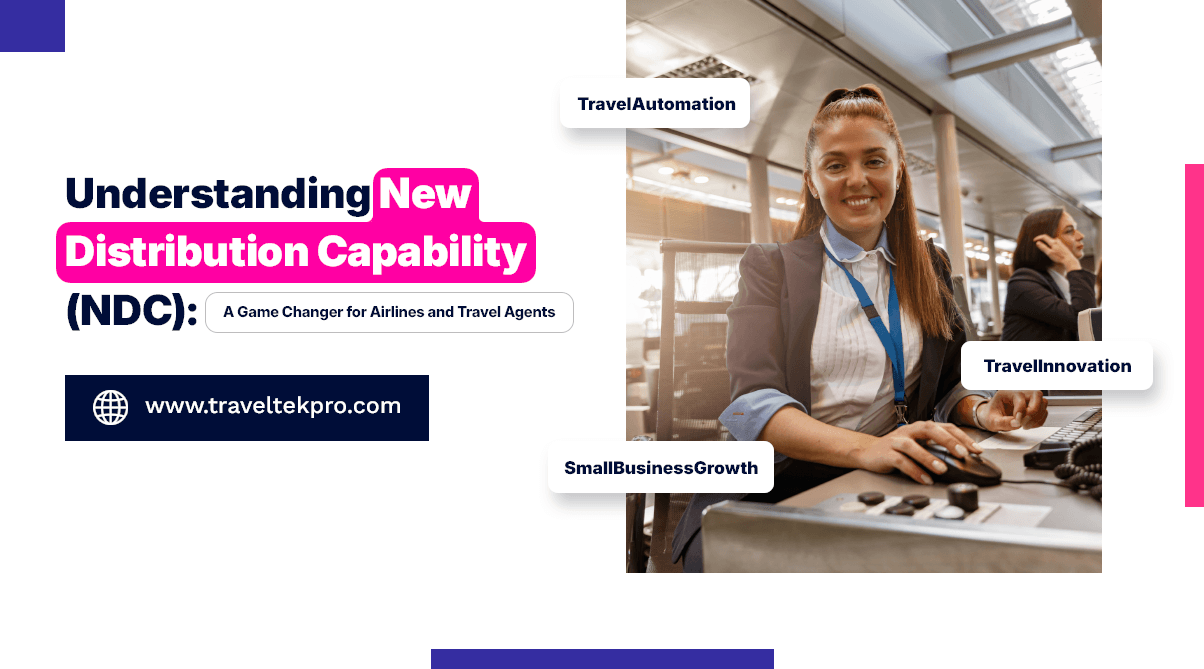Why Every Travel Agent Needs an Advanced Airline Reservation System?
The travel industry has changed dramatically in recent years. What used to be a tedious process of calling airlines, checking seat availability, and manually booking tickets has now evolved into a seamless and efficient all thanks to modern travel technology. For travel agents like you, staying ahead in the game means embracing the technological advancements. One of the most essential innovations is the Airline Reservation System that you cannot miss out on. It has revolutionized the way travel agents like you book flights and manage your business. With the advent of Flight booking software you can access real time information instantly, book tickets and even provide better customer service all from a single platform.
In today’s competitive travel landscape using outdated methods is no longer viable. Digital transformation of the travel industry is happening faster than ever before and 2025 is the perfect time for you to upgrade to more advanced solutions. In this guide you can learn everything about why travel agents like you need an advanced airline reservation system.
Definition of airline reservation system
Before you check out flight booking software for travel agents it’s very important for you to understand the basics. The airline reservation system is a digital platform that allows you to book flights for your clients. The systems connect with multiple airlines giving you access to your schedules, seat availability and prices. In essence it actually is a tool that works like a bridge between the travel agent and airlines allowing you to search for flights, make bookings and manage your customer details.
You can quickly search for flights based on different parameters like dates, destinations and airlines. Furthermore it gives you real time updates on the seat availability to avoid overbooking or errors. The system allows you to book tickets, make changes or cancel bookings directly. Compare ticket prices easily now across airlines to find the best deals for your clients. After booking the system generates a ticket for you. Store customer details including preferences and flight history easily.
It’s way more than just flight booking. It’s all about a complete tool that simplifies the workflow of travel agents like you while improving your overall customer experience.
Benefits of flight booking software
When you are a travel agent, time is money. The faster and more accurately you can process bookings the more customers you can handle which directly translates to higher profits. Here are some of the benefits of using the Airline Reservation System.
Faster and more efficient bookings
With advanced flight booking software you no longer need to waste time calling airlines or juggling multiple systems. Everything is streamlined meaning you can just make bookings in real time, check flight availability instantly, and also tickets can be issued with just a click of a button. The efficiency allows you to handle more customers without compromising on service quality.
Improved customer experience
Today’s customer expects convenience. They just want to book flights quickly and easily and they don’t want to wait for long responses. An airline reservation system allows you to offer a smooth and fast booking experience that improves your customer satisfaction. Your clients will appreciate receiving instant confirmations real-time availability and instant responses, making them more likely to return to you for bookings.
Access to multiple airlines
With an advanced Flight Booking Software sure you can get access to different airlines through the global distribution system. This means you can offer a huge range of options for your clients from low-cost carriers to premium airlines. This can ensure that you meet every customer’s specific travel requirements.
Key features of flight booking software for travel agents
1. Real time flight information
One of the best parts about the Airline Reservation System is real-time flight updates. This means you can get up-to-the-minute information on flight schedule, seat availability, and price changes. Real-time information makes it very easy for you to avoid overbooking and also ensure that your clients are never disappointed by last-minute changes.
2. Multi-currency and multi-language support
If you are serving customers from different parts of the world multi-currency and multi language support are very important. This allows your clients to see prices in their local currency and make bookings in their preferred language improving your overall customer experience.
3. Customer relationship management tools
Managing customer information is very important for repeat business. A lot of airline reservation systems come with integrated CRM tools that make it easy for you to store customer profiles, booking history preferences and more. This helps you provide customized service and keeps your customers coming back for more.
How does advanced software boost travel business performance?
1. Serve more clients effectively.
With the speed and accuracy of modern Flight Booking Software, you can easily serve more clients without overloading your system. The software automates many tasks, allowing you to handle multiple bookings and simultaneously handle different things. As a result, you will be able to take on more customers without sacrificing service quality.
2. Increased revenue and profit margins
By offering customers real-time flight options and seamless booking processes, you can increase the chance of closing deals quickly. The faster you book flights and the more options you provide, the more likely your customers are to purchase. Furthermore, your system might even suggest complementary services like hotel bookings and car rentals.
3. Gain a competitive edge
In a highly competitive travel industry, offering exceptional service is very important to stand out. Our modern airline reservation system allows you to provide faster, more efficient service, which can differentiate you from your competitors. Customers are more likely to choose a travel agent who can offer convenience and competitive pricing.
Why is 2025 the ideal time to upgrade?
2025 is shaping up to be the ideal time for travel agents to upgrade their technology.
The surge in travel demand
After a period of uncertainty, the travel industry is bouncing back. Today people are eager to travel whether for business or leisure. With this surge in demand, travel agents like you need to be more prepared to handle more bookings and offer better service than ever before.
Advanced technology is now more Affordable
Technological advancements like cloud-based software, artificial intelligence, and machine learning are more affordable and accessible than ever before. In 2025, you can get powerful tools just for a fraction of the cost of what they were a few years ago. This makes it the perfect time for you to adopt a more advanced system that can grow with your business.
Stay competitive in the market.
As technology continues to evolve, your competitors will also be upgrading their systems. To stay competitive and ensure that you remain relevant in the best possible way, you need to adopt and adapt to the best tools available, like flight booking software for travel agents.
How to choose the right flight booking software provider?
Choosing the right Airline Reservation System is very important for your success. When you choose TraveltekPro as your Flight Booking Software, you choose nothing but the best. With this software, you can get access to real-time flight information and instant booking information. The platform is really easy to use with a simple interface that requires minimal training. The dedicated support team is always available to help you with any technical or booking-related issues.
So, above all, you need to know that the travel industry is evolving and staying ahead of the competition means embracing advanced technology. For travel agents like you, the benefits of using an airline reservation system are clear: faster bookings, reduced errors and better customer service. The time to upgrade your system is now. 2025 is the perfect time to invest in flight booking software that will help you grow and stay competitive.
FAQ’s
1. What is an airline reservation system?
An airline reservation system (ARS) is a comprehensive digital platform that enables airlines to sell and manage their available seat inventory while providing real-time access to flight schedules, fare information, passenger reservations, and ticketing capabilities. These systems serve as the central hub connecting airlines, travel agencies, and customers through a unified technological framework that facilitates seamless booking transactions across multiple distribution channels. Modern airline reservation systems have evolved far beyond simple booking tools to become integrated business solutions encompassing inventory management, fare calculation, payment processing, and customer relationship management components.
2. How does flight booking software help you as a travel agent?
Flight booking software transforms the operational capabilities of travel agencies through multiple efficiency and service enhancements. Most significantly, it dramatically accelerates the booking process by automating time-consuming tasks that previously required manual intervention, such as checking seat availability across multiple airlines, calculating complex fare structures, and generating reservation documentation. This automation not only increases productivity but substantially reduces human error in the reservation process, ensuring greater accuracy in bookings and minimizing costly mistakes.
3. Is flight booking software suitable for small travel agencies?
Flight booking software is exceptionally well-suited for small travel agencies, offering scalable solutions that provide immediate operational benefits regardless of business size. The technology delivers particular value to smaller operations by effectively leveling the competitive landscape, allowing independent agencies to access the same flight inventory and booking capabilities as larger competitors. This democratization of travel technology enables even solo agents to present a professional, comprehensive service offering to clients without the need for extensive staff or infrastructure.
4. What features should you look for in an airline reservation system?
When selecting an airline reservation system, decision-makers should prioritize functionality that enhances both operational efficiency and customer experience capabilities. Essential core features include comprehensive inventory management that provides real-time access to flight availability across multiple airlines, with the ability to process complex itineraries including multi-city and round-the-world bookings.
5. How have airline reservation systems evolved over time?
The evolution of airline reservation systems represents one of the most dramatic technological transformations in the travel industry, progressing from entirely manual processes to sophisticated digital ecosystems. In the earliest days of commercial aviation, reservations were managed through purely physical means-dedicated reservation centers maintained paper index cards representing available seats, with agents literally walking to filing cabinets to check availability when booking requests arrived via telephone.
6. What’s the difference between an ARS, CRS, and GDS?
The terminology surrounding travel distribution systems often causes confusion, as the terms Airline Reservation System (ARS), Computer Reservation System (CRS), and Global Distribution System (GDS) represent related but distinct technological concepts that evolved sequentially in the travel industry. An Airline Reservation System (ARS) represents the proprietary system operated by a specific airline to manage its own inventory, schedules, fares, and passenger records. These systems focus exclusively on the airline’s own offerings and serve as the authoritative database for that carrier’s operations, including functions like revenue management and flight operations. ARS platforms are typically components of broader Passenger Service Systems (PSS) that handle all customer-facing aspects of an airline’s business.




